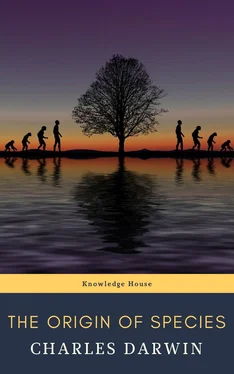The same principle is seen in the naturalisation of plants through man's agency in foreign lands. It might have been expected that the plants which would succeed in becoming naturalised in any land would generally have been closely allied to the indigenes; for these are commonly looked at as specially created and adapted for their own country. It might also, perhaps, have been expected that naturalised plants would have belonged to a few groups more especially adapted to certain stations in their new homes. But the case is very different; and Alph. de Candolle has well remarked, in his great and admirable work, that floras gain by naturalisation, proportionally with the number of the native genera and species, far more in new genera than in new species. To give a single instance: in the last edition of Dr. Asa Gray's "Manual of the Flora of the Northern United States," 260 naturalised plants are enumerated, and these belong to 162 genera. We thus see that these naturalised plants are of a highly diversified nature. They differ, moreover, to a large extent, from the indigenes, for out of the 162 naturalised genera, no less than 100 genera are not there indigenous, and thus a large proportional addition is made to the genera now living in the United States.
By considering the nature of the plants or animals which have in any country struggled successfully with the indigenes, and have there become naturalised, we may gain some crude idea in what manner some of the natives would have had to be modified in order to gain an advantage over their compatriots; and we may at least infer that diversification of structure, amounting to new generic differences, would be profitable to them.
The advantage of diversification of structure in the inhabitants of the same region is, in fact, the same as that of the physiological division of labour in the organs of the same individual body—a subject so well elucidated by Milne Edwards. No physiologist doubts that a stomach by being adapted to digest vegetable matter alone, or flesh alone, draws most nutriment from these substances. So in the general economy of any land, the more widely and perfectly the animals and plants are diversified for different habits of life, so will a greater number of individuals be capable of there supporting themselves. A set of animals, with their organisation but little diversified, could hardly compete with a set more perfectly diversified in structure. It may be doubted, for instance, whether the Australian marsupials, which are divided into groups differing but little from each other, and feebly representing, as Mr. Waterhouse and others have remarked, our carnivorous, ruminant, and rodent mammals, could successfully compete with these well-developed orders. In the Australian mammals, we see the process of diversification in an early and incomplete stage of development.
Конец ознакомительного фрагмента.
Текст предоставлен ООО «ЛитРес».
Прочитайте эту книгу целиком, купив полную легальную версию на ЛитРес.
Безопасно оплатить книгу можно банковской картой Visa, MasterCard, Maestro, со счета мобильного телефона, с платежного терминала, в салоне МТС или Связной, через PayPal, WebMoney, Яндекс.Деньги, QIWI Кошелек, бонусными картами или другим удобным Вам способом.












